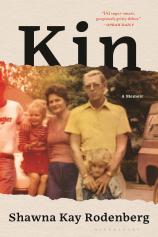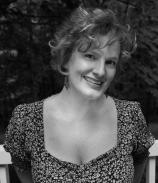Kin: A Memoir
Review
Kin: A Memoir
Appalachia, for many outsiders, is a place of myth --- debilitating poverty portrayed with both disdain and a romanticism. Writers who set their stories, both fiction and nonfiction, in Appalachia are tasked with addressing the realities of the region without demeaning the people who live there or dismissing their cultural strengths and accomplishments.
Shawna Kay Rodenberg’s memoir, KIN, is a successful example. It actually begins in Minnesota, where Rodenberg’s family lived for many years in a strict Pentecostal community called The Body (now known as The Move). But her parents, Debbie and Roy, return with her and her sister, Misti, to the family mountain property and the towns that her ancestors have lived in for hundreds of years. In both The Body and Eastern Kentucky, they strive to fit in, be their true selves and find contentment. But religious tensions, cycles of violence and poverty, and family dynamics often stand in their way.
"KIN is highly readable, even in the darkest of its many dark moments. Rodenberg is a gifted writer and brings her setting to life. It is a beautifully written look at resilience and the power of family and place."
The Body is a church community of strict adherence, intense Bible study and stringent moral norms. There is much that Rodenberg loved about being part of it. She connects her father’s attraction to the church to his experiences in the Vietnam War, though this is not made quite explicit. Rodenberg shares a series of letters from her father to his parents while he was fighting in the war. While it sheds light on his values, his connection to home and his desire to start a family with Debbie, it doesn’t account for why The Body in particular appealed to him or the physical and emotional violence he goes on to inflict on Rodenberg and, to a lesser extent, Misti.
From her behavior during their spartan years at The Body to her choice of dress in high school, much of the interaction between Shawna and Roy is one of conflict and harm. And some of the trouble Shawna gets into with her father over the years grows out of the sexual abuse she experienced at The Body, which is essentially ignored or dismissed by her family. Rodenberg’s parents are sometimes hard to like and often difficult to sympathize with, but she does a decent job of showing the complexity of the family dynamic, mostly through chapters that introduce grandparents, aunts and uncles. These chapters are some of the richest and most compelling, and she hits her stride as a storyteller.
Rodenberg doesn’t owe her readers all of her story, or the ways they can assume she came to deal with the abuse she suffered, but the memoir feels lacking without it. We know she had a career as a nurse and as a college instructor, and that she has had success as a writer. But we end with a disturbing scene of her entering into a marriage that was coerced at best and likely predatory at worst. While the prologue sets readers up for an interesting cultural critique and the righting of wrongs of assumption and stereotyping, the end of the memoir may leave readers longing for the fulfillment of that promise.
This is not to say that KIN isn’t a good book. It is. Rodenberg charges straight at many terribly difficult truths about her family but doesn’t always go as far as she could have in holding them accountable and connecting the various interesting pieces of their saga. There is so much territory to cover in her family’s story, but it is not cohesively presented.
Still, KIN is highly readable, even in the darkest of its many dark moments. Rodenberg is a gifted writer and brings her setting to life. It is a beautifully written look at resilience and the power of family and place.
Reviewed by Sarah Rachel Egelman on June 11, 2021
Kin: A Memoir
- Publication Date: August 30, 2022
- Genres: Memoir, Nonfiction
- Paperback: 352 pages
- Publisher: Bloomsbury Publishing
- ISBN-10: 1635579341
- ISBN-13: 9781635579345




